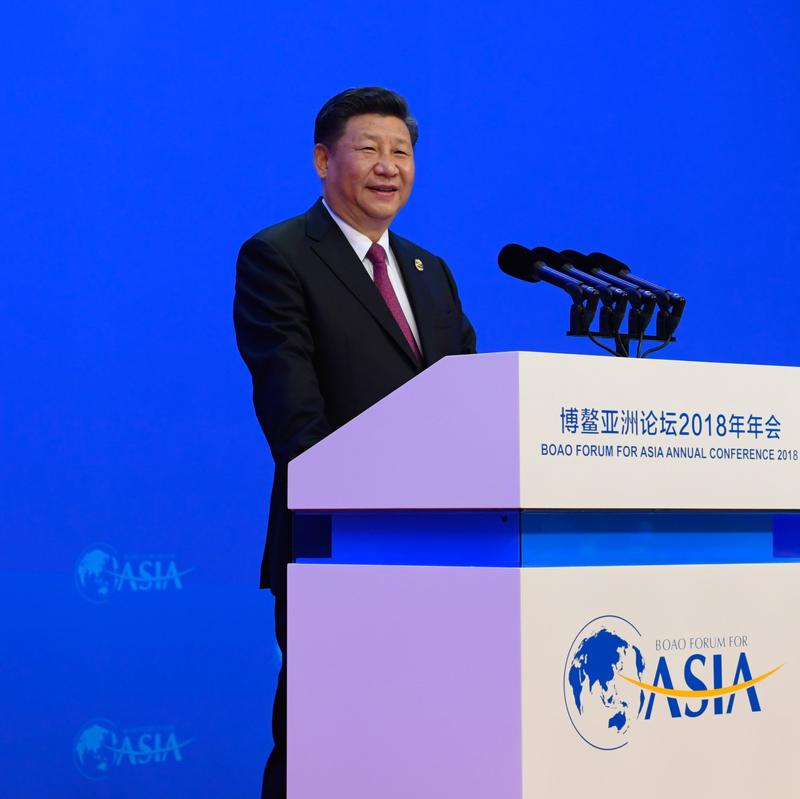Media Report

- CNN reports: "Chinese President Xi Jinping on Tuesday said his government would "significantly lower" tariffs on vehicle imports this year as part of efforts to further open its giant economy to the world. The pledge addresses one of the gripes of US President Donald Trump, who has threatened to impose new tariffs on $150 billion of Chinese goods in a trade dispute between the world's two largest economies. Experts cautioned, though, that Xi's comments may not do much to resolve the conflict, which has rocked markets in recent weeks. During an eagerly awaited speech at a development conference on the tropical Chinese island of Hainan, Xi billed the planned cut in vehicle tariffs and a series of other measures as "a new phase of opening up." But many of the steps he outlined are ones Beijing has already proposed in some form."
- CNBC reports: "China has approached Vanuatu about establishing a permanent military presence on the tiny Pacific island, Australia's Fairfax Media reported on Tuesday, a plan that would likely stoke regional tensions. The report, citing unnamed sources, said no formal proposal had yet been made, but preliminary talks have been held about locating a full military base on Vanuatu. It added that the prospect of a Chinese military outpost so close to Australia has been discussed at the highest levels in Canberra and Washington. Australian Foreign Minister Julie Bishop on Tuesday said she had been assured by Vanuatu officials that there was no formal proposal from Beijing, but she stopped short of addressing whether there had been any unofficial talks."
- Jonathan Hillman comments in the Washington Post: "China's $1 trillion push to build infrastructure across Asia evokes romantic comparisons to the ancient Silk Road, but there is a more recent chapter of history that urges caution. More than a century and a half ago, the United States was a rising power racing westward, building transcontinental railways that delivered limited benefits and exacted a high cost from society. Today, China has taken on that role. The parallels are striking — and troubling. Mixing economic and strategic aims, America's transcontinental railways became an unquestionable national imperative. Their actual construction, however, catered more to elite interests than collective wellbeing. Political favors trumped economic fundamentals thanks to shady financing, excessive subsidies and a heady dose of nationalism."
Calendar
- 2018-04-09 Trump blasts ‘stupid’ trade practices with China
- 2018-04-06 China says it will fight back 'at any cost' against US trade tariffs
- 2018-04-06 China says it will fight back 'at any cost' against US trade tariffs
- 2018-04-05 Trump Doubles Down on Potential Trade War With China
- 2018-04-04 Trump pushes back on fears of a trade war with China
- 2018-04-03 The U.S. wrote the rules for global trade. Now China is using them against Trump.
- 2018-04-02 It’s Not Just China's Retaliatory Tariffs That Should Worry U.S. Businesses
- 2018-03-30 China uses economic muscle to bring N Korea to negotiating table
- 2018-03-29 China warns US not to open Pandora's Box, unleash trade ills on world
- 2018-03-28 Kim’s Message for Trump: China Is Back on Our Side
News
- CNN China's Xi Jinping says tariffs on car imports will be cut this year
- CNBC China is reportedly proposing a permanent military base in the South Pacific
- The Wall Street Journal Xi Vows Greater Access to China, Warns Against 'Cold War Mentality'
- CNBC If the US and China stop feuding on trade, the next clash could be over Taiwan
- Reuters China's Xi urges Taiwan business community to shun independence
- USA Today China's President Xi Jinping offers U.S. possible trade concessions
- CNN Trump promises to 'make it up' to farmers hit by China tariffs
- The Wall Street Journal Trump Acknowledges Farmers to Feel Impact From China Trade Actions
- CNN How American cars are really sold in China
- Politico Trump blames everyone but China for trade deficit
- Bloomberg China's Strengths in a Trade Spat Are Also Its Weaknesses
- Bloomberg Asia's Hottest Stock Is a Bet on China's Military Expansion
Commentary
- The Washington Post Is China making a trillion-dollar mistake?
- USA Today Trade with China isn't our top economic challenge. Donald Trump should tackle automation.
- The New York Times How Trump Misunderstands Trade
- The Hill Xi speech shows China willing to deal, but not with a gun to its head
- Bloomberg China's Strengths in a Trade Spat Are Also Its Weaknesses
- MarketWatch China has good reasons to avoid a full-fledged trade war
- Forbes In This Game Of Threats, China Carries Fundamental Weaknesses
